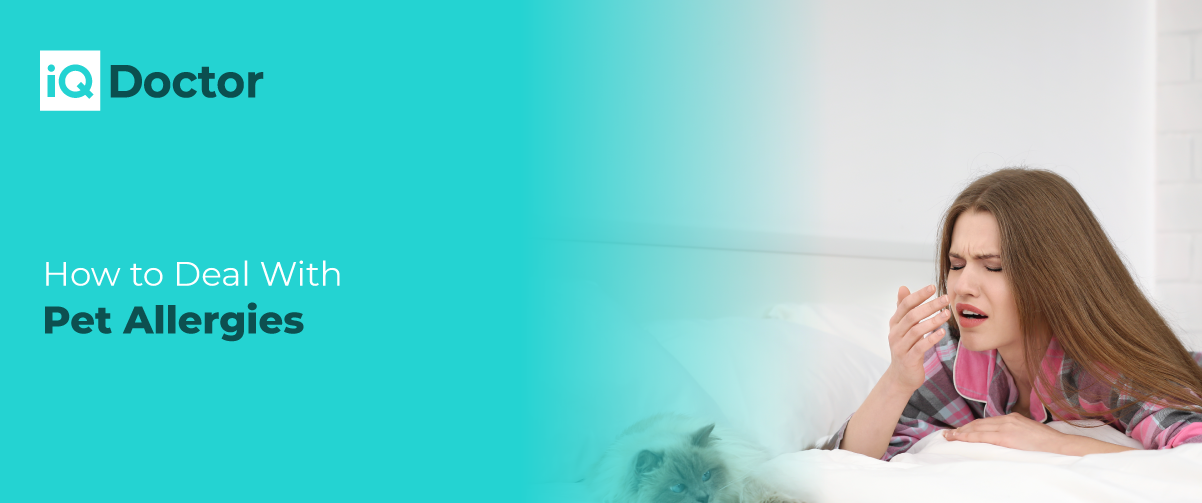How to Deal With Pet Allergies
25 July, 2022 | Jane Thomas - Marketing

Pets are one of life's greatest blessings. They love you unconditionally, and the bond between us and our pets can last a lifetime. But sometimes, it can become hard to be around our pets due to allergies, and that can be difficult. Giving up a Pet is not an option for most of us, so we have to instead figure a way to keep allergies at bay.
46% of UK households own a pet. It is clear that we are a nation of pet lovers, but 1 in 4 of us suffer from pet-related allergies, with pet dander being one of the main allergens. Allergy from pets works the same way as any other allergy. Exposure to allergens can cause sneezing and a runny nose. Some people may also experience asthma signs, wheezing and difficulty breathing. If symptoms become severe, a doctor’s visit may become essential, and if things do not change, removing the pet may have to be the last option after all.
To help you be healthy with your pets, we have listed below ways of how to deal with pet dander allergies. Read on to understand what triggers pet allergies, what helps with pet allergies, and which pet allergy treatment is best for you.
Dander and Saliva
An allergy to pet dander or even saliva is an allergy to any pet. Dander is dead skin cells containing proteins that usually attack the eyes and airways and force an allergic reaction out of the body. Our immune system sees such foreign proteins as harmful, often resulting in asthmatic symptoms, allergic rhinitis (inflammation of the inside of the nose), eczema or urticarial (hives). Surprisingly, the hair or fur on an animal is not allergic. Instead, it can trap outside allergens such as pollen or dust.
Most pet allergies are either from cats or dogs. However, people can develop allergies to many animals such as rabbits, small rodents, pet birds, and even horses. Allergens spread from pets by sticking to surfaces around the house. Any surface the pet has been near is likely to have allergens on it. When cleaning that surface or the pet, these allergens will get suspended in the air. For these reasons, allergens can remain in a home for up to six months, even after a pet is gone.
How To Cope With Pet Allergies
Nobody wants to get rid of their pets. So now that we precisely know what triggers pet allergies let's discuss how to cope with pet allergies. Here are some 5 tips.
Allergy-Free Zone
To cope with your allergies, your best bet is to have pet-free zones. Ideally, this should be your bedroom. Prohibit the pet’s access to it. This way, only limited areas in your house will have allergens. You can also add impermeable covers to all furniture in your room. As a result, no dust or pet dander will settle into the fabrics either.
You can install HEPA air cleaners where you and your pet spend most of the time. These filters read nearly 100% of micro allergens in the air. Always remember to change filters and take special care of these filters.
Keep Things Clean
Frequently cleaning your house and vacuuming can keep allergens from piling up in your home. A vacuum that can trap allergens instead of redistributing them through the air is usually what regular hand dusting does. Once you have the right vacuum, empty it outside in your outdoor garbage to prevent the spreading of the trapped allergens in your home. If you plan on cleaning the furniture, you should do that outside as well while wearing protective clothing.
Groom and Bathe Pets
It goes without saying, but remember to bathe and groom your pets regularly. Wash your pet at least once every two to three months is generally the right amount. However, if they genuinely need a bath, once a month or once a week is fine as well. Everything depends on the type of pet, how active they are, and the surroundings.
Frequent bathing removes the dead skin flakes from your pet’s skin and can reduce allergens by as much as 84%. Remember always to use shampoo meant for your pet. You can contact a vet if you do not know which products to use.
Hypoallergic Breeds
According to the Asthma and Allergy Foundation of America, there is no such thing as a breed that does not cause allergies. Instead, it is people who can be allergic to certain breeds. Some breeds do indeed produce fewer allergens, but it is the reaction of your body that matters. That is why you should always spend time with the animal before you keep them as a pet.
Medication and Treatment
If any of the other solutions are not working, there are other treatments to draw upon. These tend to include immunotherapy (allergy shots), steroidal and antihistamine nose sprays and antihistamine medicines. The medications for pet-related allergies are widely available today, and you can easily get them from your local pharmacy or even order them online. These include Fexofenadine, Cetirizine, Loratadine and Piriton. Decongestants and antihistamines medicines are usually enough to manage your allergy symptoms. If not, you should see a doctor. They may suggest different medications or even immunotherapy.
Immunotherapy can be expensive, but it is effective. It works by introducing allergens in small quantities and then taking an allergy shot. Over time, the doses are increased, and this helps the body slowly adapt to these allergens.
IQ Doctor
If you are looking for pharmaceutical options for your pet allergies, IQ Doctor is the place for you. We are a UK pharmacy fully licensed by the Medicines and Healthcare products Regulatory Agency (MHRA).
Whether it’s Fexofenadine, Cetirizine, Loratadine or Piriton, we have the medications you may need. You can visit our website and get a free consultation with one of our medical professionals to determine what medicine may suit you best. Once you place your order, the medication will be shipped to you immediately.
Reviewed By

Omar El-Gohary
The superintendent and lead pharmacist - registration number 2059792.
Omar is passionate about developing healthcare technology to empower our patients.


